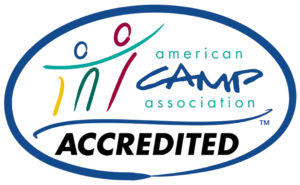Safety Is Our Priority
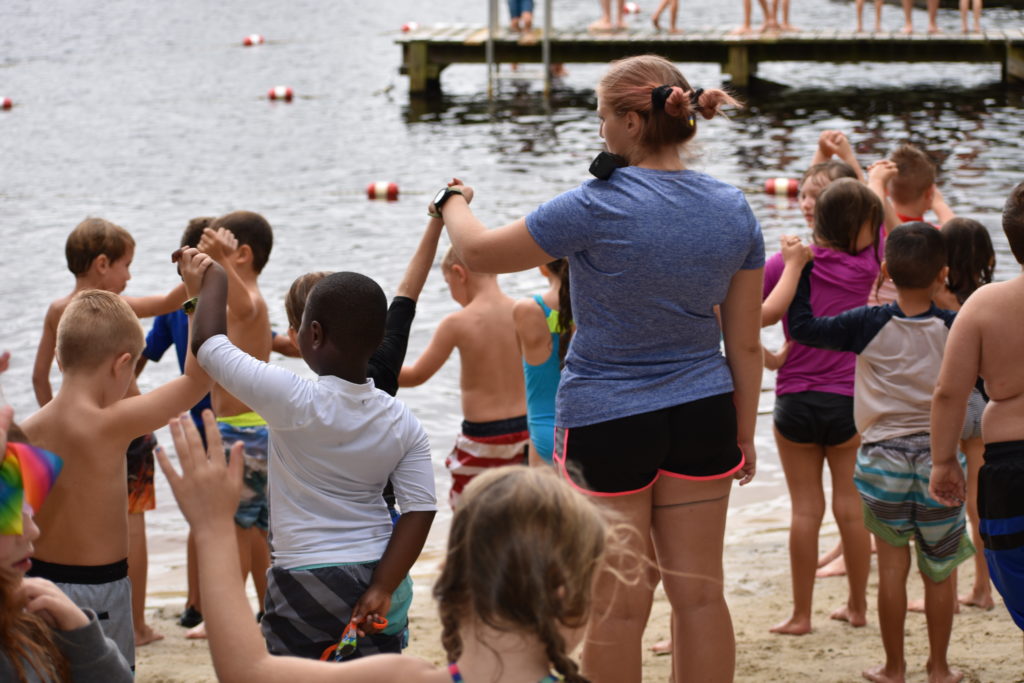
To achieve Accreditation, YMCA of the Pines underwent a rigorous process to implement Praesidium’s Accreditation Standards focusing on eight primary operational areas within their business: policies, screening and selection, training, monitoring and supervision, consumer participation, internal feedback systems, responding, and administrative practices. Praesidium then verified the Y’s successful implementation of these standards. YMCA of the Pines will be accredited for three years, and during this time will commit to uphold fundamental organizational values and stringent safety practices that demonstrate their commitment to protecting those in their care from abuse.
Praesidium Accreditation® provides solid proof of sound risk management practices and the honor distinguishes the YMCA of the Pines from others in their industry. “We are pleased to send the message that we will not compromise the safety of those in our care—for any reason,” said Mark Dibble, CEO of the YMCA of the Pines. “As an entire organization, we are dedicated and committed to proactively keeping those in our care safe from abuse.”
Here are just a few of the steps our summer camps take to protect our campers:
• Each staff member is interviewed and submits to a background check (staff over the age of 18). We utilize a vendor to perform a Social Security Number identity trace, a county criminal search, and an enhanced nationwide criminal, and sex
offender search. All staff members are required to have a cleared background check prior to being hired.
• For international staff, we partner with agencies that conduct background checks in the staff member’s home country prior to the individual being eligible for hire by our organization. Returning international staff submit to a domestic
background check as well.
• Summer Camp employees participate in a week-long orientation, which addresses camp procedures related to staff-to-camper ratios, safety protocols and procedures, youth development, counseling techniques, bullying resolution, and more.
Staff hired after training is complete go through an on-boarding process, and receive mandatory trainings as well.
• Staff members also complete a training module offered by Praesidium regarding child protection in a day or overnight camp setting.
• Staff members are not permitted to be alone with a camper. Rather, we follow the “Rule of 3:: 2 staff members with 1 camper, or 1 staff member with 2 or more campers, including during bathroom and shower visits. During bathroom/shower
visits, our staff stay within earshot of campers.
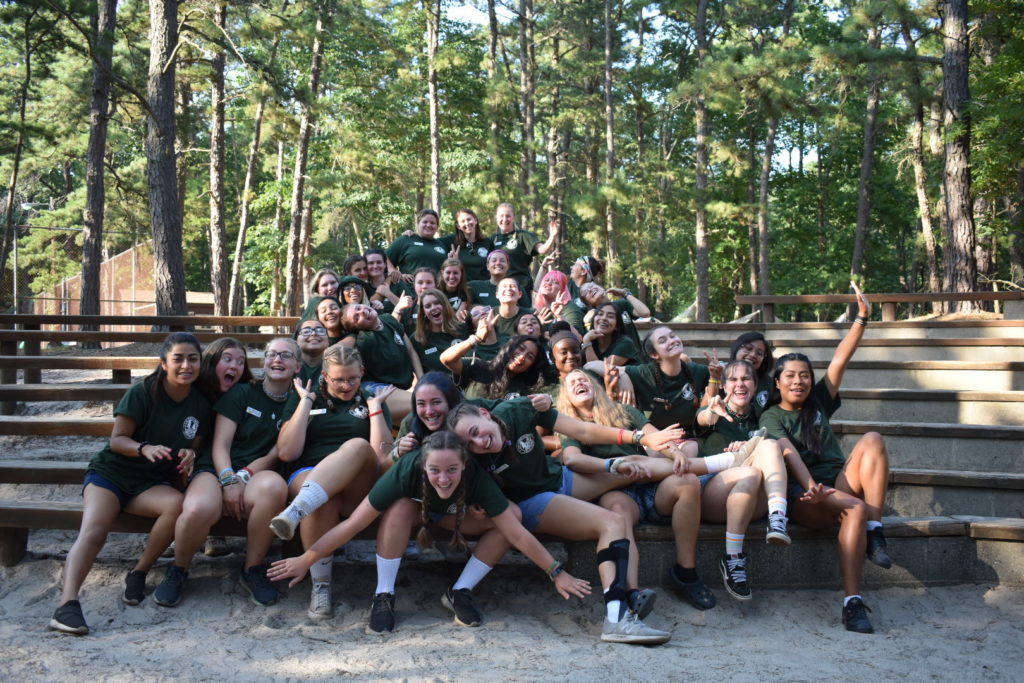
In order to achieve ACA accreditation, YMCA of the Pines demonstrates compliance with many mandatory standards specific to each activity and program we operate specific to: Program, Health Care, Site and Food Services, Operational Management, Human Resources, and Transportation. Many of these standards pertain to safety.
The American Camp Association collaborates with experts from the American Red Cross, American Academy of Pediatrics, and other youth-serving agencies to assure that current practices at YMCA of the Pines are up-to-date, research-based standards in camp operations.
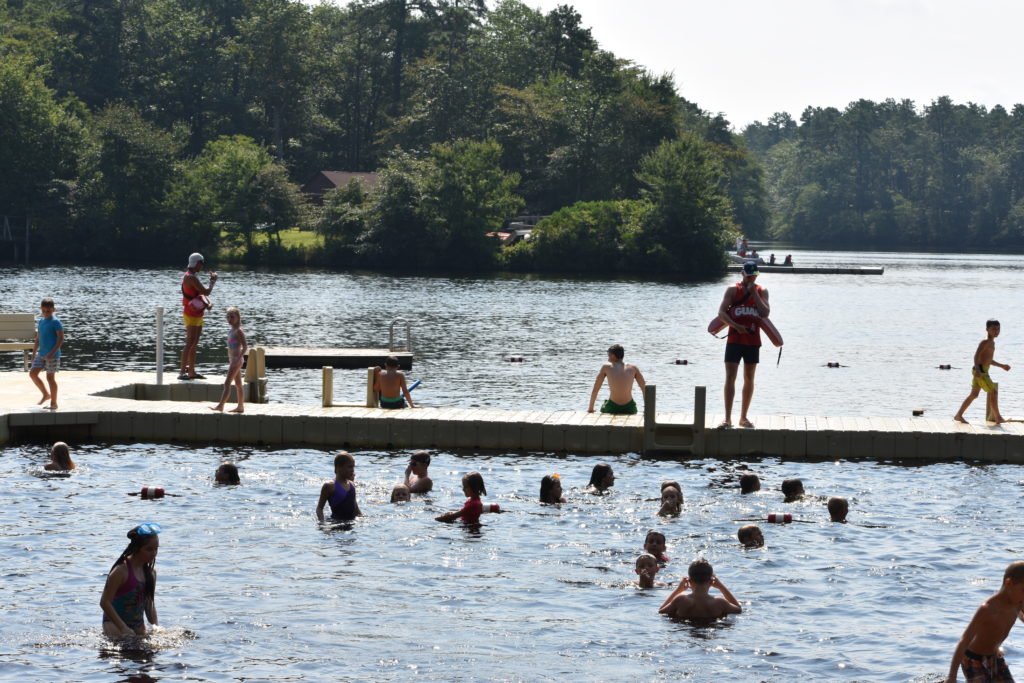
It should also be noted that our waterfronts are inspected annually by the Burlington County Department of Health to ensure that the waterfronts have sufficient first aid and lifeguarding supplies, that the equipment is in good working order, and that the waterfront is otherwise in good shape. In addition to this annual inspection, our waterfronts are sampled by a third-party vendor weekly during the “swimming season” to ensure that the water itself is safe for swimming.
With respect to swimming procedures, every camper participates in a swimming evaluation prior to having “free swim” in our lake. Our lifeguards will evaluate the camper’s swimming ability, and place campers in the appropriate swim-level sections. Each of our waterfronts is sectioned off into three different swimming levels based on the depth of the water – white, green, and red.
The white section is open to all campers, and is the shallowest section. Campers of all ages should be able to stand in the white section, as part of the evaluation includes having the camper walk out to touch the rope line at the deepest end of the section.
The green section is the middle section and requires a camper to demonstrate the ability to swim with some endurance. Finally, the red section is our deepest section, and is best for campers who can comfortably swim for extended periods of time, without touching the bottom.
Our lifeguards take their jobs very seriously, and watch during tests for signs that campers may not be in the safest section. Signs include:
- repeated motions of reaching for the bottom of the lake for support or a break;
- fully submerging their head at any point of the test when doing so is not required;
- overexertion or if the camper claims to feel too tired during the test;
- an inability to swim a complete dock length of one of the test strokes; and
- reaching for the dock for assistance or support.
Campers are encouraged to test for more advanced swim levels at the beginning of each session. With hard work and patience, campers can advance to deeper sections. After the swim evaluation is complete, campers will receive a swim tag that includes their name and swim section.
To further our safety measures at the waterfront, campers will be assigned a swim buddy. Swim buddies must swim in the same section together. Before entering the waterfront, the swim buddies will give their swim tag to the lifeguard. The lifeguard will place the swim tags on our buddy board that is specifically designed for the swim sections’ tags.
At routine intervals, our lifeguards will call “buddy check. During a “buddy check,” all campers and staff exit the water and sit on the beach area or dock, depending on their swim section. Campers and staff will find their buddy and hold their hands in the air together. The lifeguards will count to be sure the number of buddy pairs match the buddy pairs on the board. This procedure ensures that all of the campers that have entered the waterfront are accounted for. Before campers are able to go back into the water, lifeguards will rotate to different guard areas of the swimming sections.
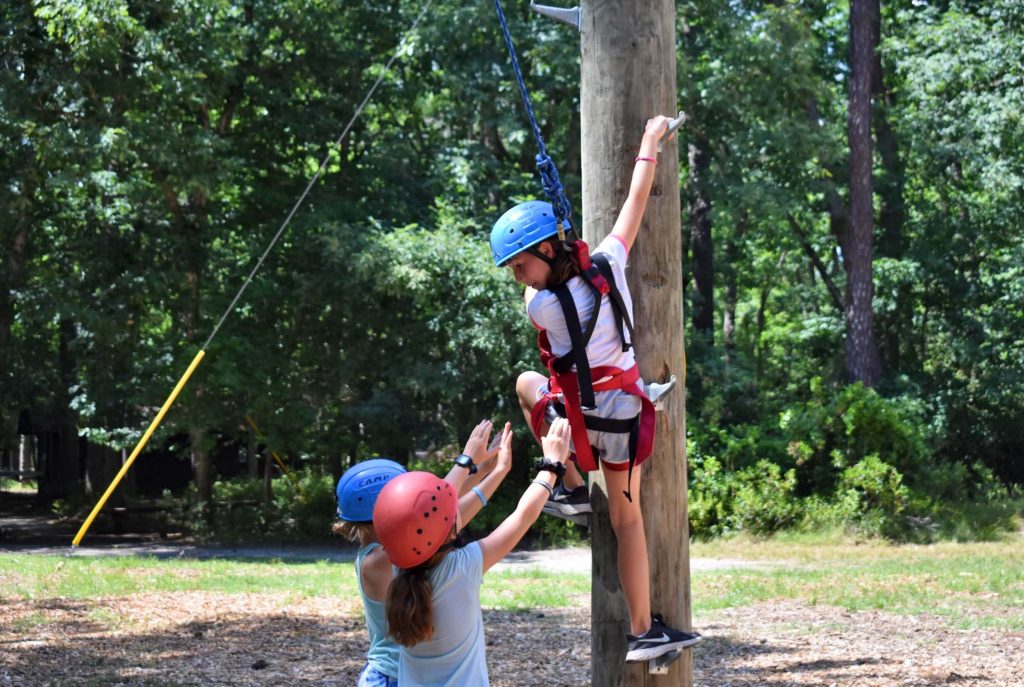
With respect to our staff, we have several levels of supervision and training required. Several of our full-time staff who oversee the challenge course in some capacity are ACCT certified, or will gain a certification within one-year of hire, in challenge course operations, either as a certified Level II operator or manager. For context, to obtain a Level II certification, a staff member must have completed 40 hours of training within the last year, have at least 200 hours of documented challenge course facilitation, and then complete the 40-hour Level II training, written test, and skill demonstration.
Additionally, our staff who work on the challenge course throughout the summer camp season attend a week-long on-site training conducted by a third-party ACCT PVM in June each year, prior to the start of the summer camp season. During the summer, staff are supervised by dedicated managers who have been approved by a third-party vendor to oversee challenge course operations, and attend in-services conducted in-house and/or with a third-party vendor to continue to train on technique, inspect the course, practice rescues, and attend to the gear and equipment. Of course, inspections of the course and gear take place on a routine basis as well.
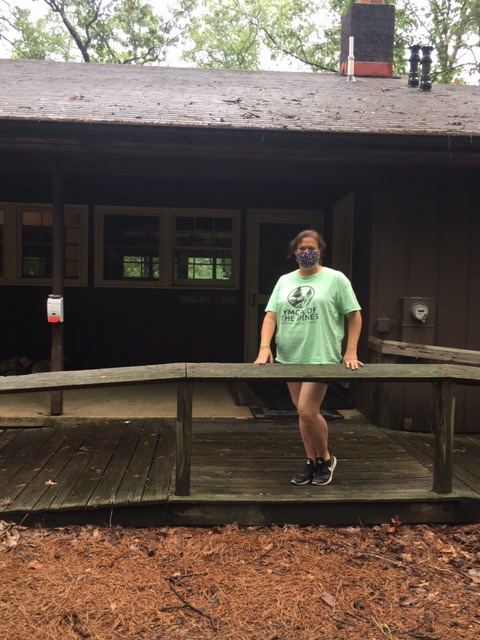
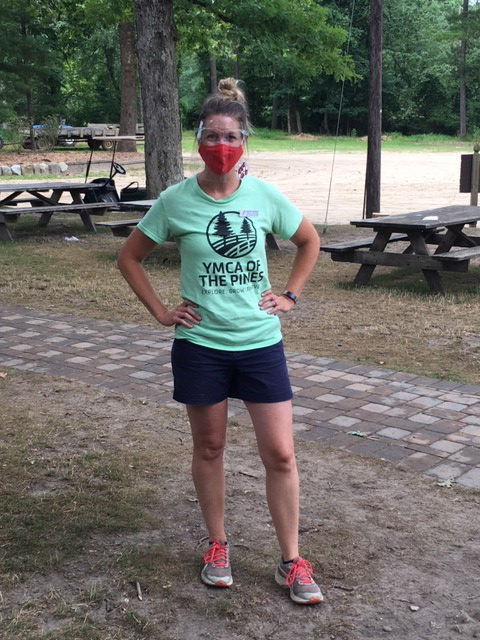
Each camp (Lake Stockwell Day Camp, Camp Ockanickon, and Camp Matollionequay) has an on-staff health care provider and a fully stocked, climate-controlled infirmary to address campers’ medical needs. In addition to our health care team, many of our staff are trained and certified in cardiopulmonary resuscitation (CPR), use of an automated external defibrillator (AED), and basic first aid.
Upon arrival to camp, our health care team will inventory and safe guard all prescription and over-the-counter (OTC) medications. All medications brought to camp are administered by our health care staff. In the event a camper becomes ill or injured, our experienced health team will evaluate and treat the camper within the parameters set forth by the parents/guardians, in conjunction with our Standing Orders (medical guidelines for care reviewed by a local physician, Dr. Michelle Festa, from Virtua Primary Care in Medford).
Our health care staff will contact you if any of the following occur to your camper while at camp:
- Receives a bee/wasp sting.
- Any lacerations that may leave a scar.
- Has a temperature greater than 101°F.
- Multiple visits to the Infirmary for the same issue.
- Need for further evaluation by a physician for a non-emergency.
- If the camper must visit a hospital or clinical care for evaluation.
There is an ambulance-dispatch station fewer than 5 miles from camp, and we are local to several hospitals including Virtua Health (Marlton, Voorhees, and Mt. Holly), and a trauma center at Cooper University Hospital (all within 15-45 minutes from camp).
At camp, we strive to protect the safety and health of all of our campers, and we are confident that our skilled and experienced health care team will keep our campers safe and camper families pleased!
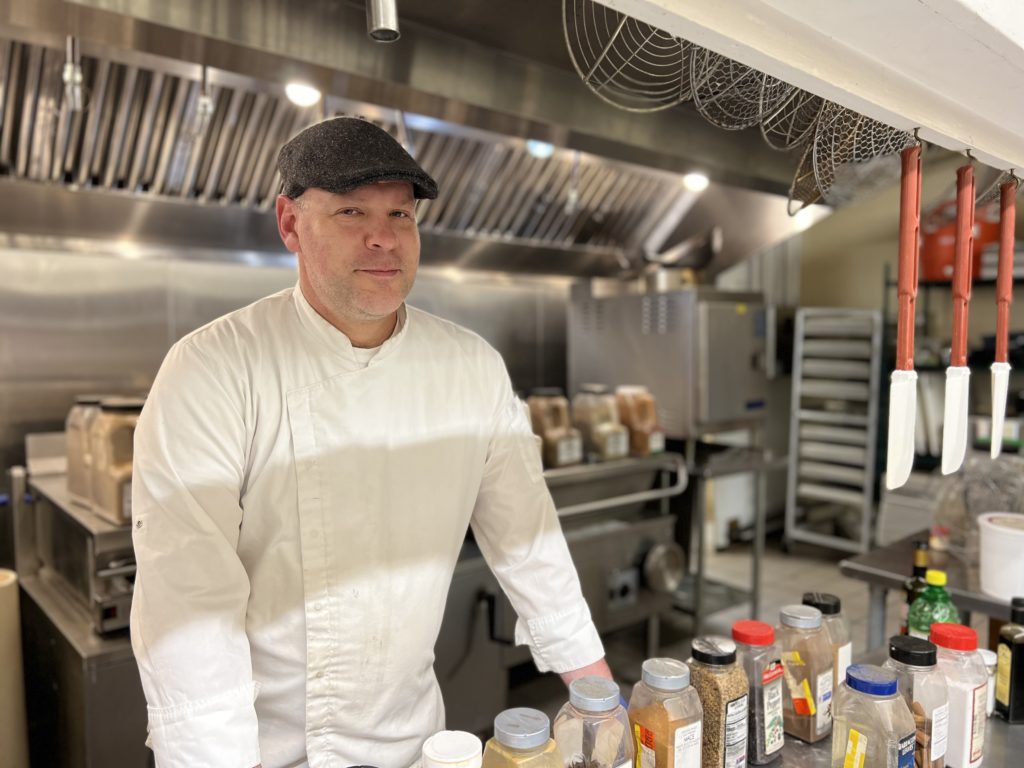

At YMCA of the Pines, food service staff are certified by ServeSafe, a national food-safety training company which provides training and certification for food service professionals. Several of our staff, including our Executive Chef, are ServeSafe Managers which means they have taken an extensive course related to best-practices for food safety and sanitation, and passed a written exam. Further, our seasonal summer camp staff complete ServeSafe “Food Handler” and “Allergens” trainings and obtain certifications for the same prior to the start of each summer camp season!
The Burlington County Department of Health conducts an inspection of both dining halls, as referenced above, annually each summer as well. These inspections include reviews of the food storage areas, cooking equipment, preparation areas, and cleaning areas, along with inspections of staff procedures and sanitation efforts. They even check to make sure the bleach and sanitizing solutions used are at the appropriate strength!
At YMCA of the Pines, we take food allergies seriously. We are “peanut friendly” such that we do not serve any foods with peanuts or peanut products. We run allergy reports prior to the start of each session, and provide campers with meal accommodations and alternate options to ensure that every camper leaves the dining hall full, and with a smile!
